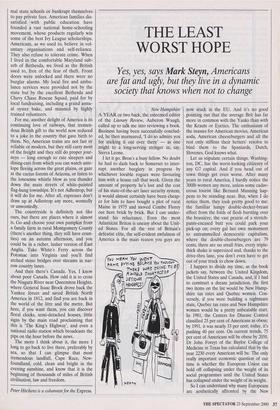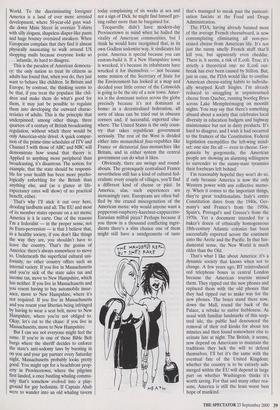THE LEAST WORST HOPE
are fat and ugly, but they live in a dynamic society that knows when not to change
New Hampshire A YEAR or two back, the esteemed editor of the Literary Review, Auberon Waugh, called up to talk me into reviewing a book. Business having been successfully conclud- ed, he then murmured, 'I do so admire you for sticking it out over there' — as one might to a long-serving stringer in, say, Sierra Leone.
I let it go. Bron's a busy fellow. No doubt he had to dash back to Somerset to inter- rupt another burglary in progress by whichever lovable rogues were favouring him with a house call that week, Given the amount of property he's lost and the cost of his state-of-the-art laser security system, it would almost certainly have been cheap- er for him to have bought a plot of rural Maine in 1975 and moved Combe Florey out here brick by brick. But I can under- stand his reluctance. Even the most Atlanticist Briton is uneasy about the Unit- ed States. For all the rest of Britain's defeatist elite, the self-evident awfulness of America is the main reason you guys are now stuck in the EU. And it's no good pointing out that the average Brit has far more in common with the Yanks than with the Krauts or Eyeties. The enthusiasm of the masses for American movies, American soda, American cheeseburgers and all the rest only stiffens their betters' resolve to bind them to the Spaniards, Dutch, Slovenes, God knows what.
Let us stipulate certain things. Washing- ton, DC, has the worst-looking citizenry of any G7 capital. And if you head out of town things get even worse. After many years in rural America, I hardly notice the 3001b women any more, unless some cadav- erous tourist like Bernard Manning hap- pens to be standing near. But, when I do notice them, they look pretty good to me: the familiar lumpy double-decker-breast effect from the folds of flesh bursting over the brassiere; the vast prairie of a stretch- pants-encased butt you could park your pick-up on; every gal her own monument to untrammelled democratic capitalism, where the double-cheeseburgers are 79 cents, there are no small fries, every triple- thick shake is supersized and, thanks to the drive-thru lane, you don't even have to get out of your truck to chow down.
I happen to divide my time, as the book jackets say, between the United Kingdom, the United States and Canada, and, if I had to construct a dream jurisdiction, the first two items on the list would be New Hamp- shire tax rates and Quebec women. Con- versely, if you were building a nightmare state, Quebec tax rates and New Hampshire women would be a pretty unbeatable start. In 1981, the Centers for Disease Control classified 25 per cent of Americans as obese; by 1991, it was nearly 33 per cent; today, it's pushing 40 per cent. On current trends, 75 per cent of Americans will be obese by 2050. Dr John Foreyt of the Baylor College of Medicine in Texas has calculated that by the year 2230 every American will be. The only really important economic question of our time is whether the European Union can hold off collapsing under the weight of its social programmes until the United States has collapsed under the weight of its weight.
So I can understand why many Europeans are aesthetically affronted by the New World. To the discriminating foreigner America is a land of ever more arrested development, where 50-year-old guys wad- dle down Main Street in oversize T-shirts with silly slogans, shapeless diaper-like pants and huge bouncy oversized sneakers. When Europeans complain that they find it almost physically nauseating to walk around US shopping malls because everyone looks so . . infantile, its hard to disagree.
This is the paradox of American democra- cy: the only nation to treat its citizens as adults has found that, when you do, they just want to behave like children. In Britain and Europe, by contrast, the thinking seems to be that, if you treat the populace like chil- dren and make them do what's good for them, it may just be possible to regulate them into developing the outward charac- teristics of adults. This is the principle that underpinned, among other things, three quarters of a century of British broadcasting regulation, without which there would be only American-style drivel. A quick compar- ison of the prime-time schedules of ITV and Channel 5 with those of ABC and NBC will demonstrate how sound that theory is. Applied to anything more peripheral than broadcasting, it's disastrous. The notion, for example, that the state should be responsi- ble for your health has been more psycho- logically enfeebling for the British than anything else, and (as a glance at life- expectancy rates will show) of no practical benefit, either.
That's why stick it out over here, drooling lardbutts and all. The EU and most of its member states operate on a set menu; America is a la carte. One of the reasons I'm a federalist — in the proper sense, not its Euro-perversion — is that I believe that, in a healthy society, if you don't like things the way they are, you shouldn't have to leave the country. That's the genius of America: there's always somewhere to move to. Underneath the superficial cultural uni- formity, no other country offers such an internal variety. If you live in Massachusetts and you're sick of the state sales tax and income tax, move to New Hampshire, which has neither. If you live in Massachusetts and you resent having to buy automobile insur- ance, move to New Hampshire, where it's not required. If you live in Massachusetts and you resent your liberties being infringed by having to wear a seat belt, move to New Hampshire, where you're not obliged to. Okay, let's cut to the chase: if you live in Massachusetts, move to New Hampshire.
But I can see not everyone might feel the same. If you're in one of those Bible Belt burgs where the sheriff decides to enforce the state's anti-sodomy laws by bursting in on you and your gay partner every Saturday night, Massachusetts probably looks pretty good. You might opt for a beachfront prop- erty in Provineetown, where the pilgrims first landed, a once bustling whaling commu- nity that's somehow evolved into a play- ground for gay hedonists. If Captain Ahab were to wander into an old whaling tavern today complaining of six weeks at sea and not a sign of Dick, he might find himself get- ting rather more than he bargained for.
Tocqueville didn't have modern-day Provincetown in mind when he hailed the vitality of American communities, but I think he would have recognised that, in its own Godless sodomite way, it vindicates his point. America is special because you can custom-build it. If a New Hampshire town is wrecked, it's because its inhabitants have wrecked it for themselves — not because some minion of the Secretary of State for the Environment has looked at a map and decided your little corner of the Cotswolds is going to be the site of a new town. Amer- ica is the dominant nation across the globe precisely because it's not dominant at home: in a decentralised federation, all sorts of ideas can be tried out in obscure corners and, if successful, exported else- where. The United States is the only coun- try that takes republican government seriously. The rest of the West is divided either into monarchical faux-republics like France or dictatorial faux-monarchies like Britain, and in either system the central government can do what it likes.
Obviously, there are swings and round- abouts. The grotesquely centralised France nevertheless still has a kind of cultural fed- eralism: every couple of villages, you'll find a different kind of cheese or pâté. In America, alas, such experiences are increasingly rare. Europeans are often baf- fled by the crazed miscegenation of the American menu: why would anyone want a pepperoni-raspberry-hazelnut-cappuccino- Eurasian milfoil pizza? Perhaps because if you throw in a thousand conflicting ingre- dients there's a slim chance one of them might still have a smidgeonette of taste that's managed to sneak past the pasteuri- sation fascists at the Food and Drugs Administration.
The FDA, having already banned most of the average French cheeseboard, is now contemplating eliminating all non-pro- cessed cheese from American life. It's not just the runny smelly French stuff that'll kill you, but apparently even cheddar. There is, it seems, a risk of E.coli. True, it's strictly a theoretical one: no E.coli out- break has ever been caused by Stilton. But, just in case, the FDA would like to confine American cheese-eating habits to individu- ally wrapped Kraft Singles. I'm already reduced to smuggling in unpasteurised cheese from Quebec, running bootleg Bries across Lake Memphremagog on moonlit nights. You may say that there's something absurd about a society that celebrates local diversity in education budgets and highway maintenance but not in dairy products. It's hard to disagree, and I wish it had occurred to the framers of the Constitution. Federal legislation exemplifies the left-wing mind- set: one size fits all — even in cheese. Gor- gonzola by gorgonzola, the American people are showing an alarming willingness to surrender to the nanny-state tyrannies their forebears left behind.
I'm reasonably hopeful they won't do so, if only because America is now the only Western power with any collective memo- ry. When it comes to the important things, they're great traditionalists. Italy's entire Constitution dates from the 1940s, Ger- many's and France's from the 1950s. Spain's, Portugal's and Greece's from the 1970s. Yet a document intended for a baker's dozen of ethnically homogeneous 18th-century Atlantic colonies has been successfully exported across the continent unto the Arctic and the Pacific. In that fun- damental sense, the New World is much older than the Old.
That's what I like about America: it's a dynamic society that knows when not to change. A few years ago, BT reintroduced red telephone boxes in central London because the American tourists missed them. They ripped out the new phones and replaced them with the old phones that they had ripped out to make way for the new phones. The boxes stand there now, down the Mall, round the back of the Palace, a rebuke to native feebleness. As usual with familiar landmarks of this seep- tred isle, the public had denounced the removal of their red kiosks for about ten minutes and then found somewhere else to urinate late at night. The British, it seems, now depend on Americans to maintain the traditions they lack the will to defend themselves. I'll bet it's the same with the eventual fate of the United Kingdom: whether the country is to be entirely sub- merged within the EU will depend in large part on whether Washington thinks it's worth saving. For that and many other rea- sons, America is still the least worst best hope of mankind.























































































 Previous page
Previous page